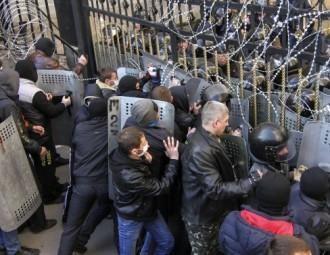Uladzimir Matskevich: Putin purposefully looks for reasons to bring troops further into Ukraine

Introduction of NATO’s peacemaking forces into the Ukraine’s territory is the most realistic scenario for averting Russian military aggression.
Last Sunday a number of Ukraine’s regions witnessed another wave of separatist actions, seizures of buildings and attacks at policemen. The unrest was well-coordinated, crowds of assaulters intentionally brought many women and children, so the militia got a strict command to prevent the bloodshed.
Uladzimir Matskevich, the head of the Board of the International Consortium “EuroBelarus”, analyses the reasons for yet another wave of separatist actions at the east of Ukraine on April 6.
- The events in Kharkov, Donetsk and Lugansk indicate that Putin decided not to stop at Crimea’s annexation, don’t they?
- The events as of April 6 in at least three Ukraine’s regions show that the actions of separatist forces are coordinated, as without special support, without previously discussed plan such activity would be impossible. Any sensible person understands that. And it is only one actor who can be behind the events at the east of Ukraine, and it is Kremlin. In view of absence of Ukrainian motives, Putin purposefully looks for reasons to bring troops further into continental Ukraine to “protect the Russian-speaking population” or someone else.
- It is strange that yet another wave of separatism caught the east and south of Ukraine after the Central Electoral Commission brought closure to the registration of candidates on April 3: 23 candidates were registered and 23 candidates were denied registration. Does it mean that Kremlin has lost its hopes to set a pro-Russian candidate on the Ukrainian throne?
- It is hardly true. For one of the pro-Russian candidates to get a chance of becoming Ukraine’s leader the country need to be destabilized. If the situation in the country becomes stable after the Crimea’s annexation, if the current interim government starts economic reforms – it leaves no chances to the pro-Kremlin candidates; whereas destabilization, devastation and chaos can bring them victory.
- What’s next? Central Electoral Commission has announced that it is only the state of emergency or the state of martial law that can disrupt the presidential election scheduled on May 25. What will Kremlin do?
- Kremlin can be preparing different scenarios to destabilize the situation in Ukraine, and will choose the most favourable for realization in the concrete conditions.
Military scenario is the most unfavorable one, whereas destabilization with the help of separatists, terror, devastation is more preferable. Russia still sees a possibility to destroy Ukraine’s integrity and to submit it. Ukraine’s federalization is the most satisfying variant, whereas the annexation of south-eastern Ukraine and the establishment of puppet government is the toughest one.
- Which role will Lukashenka play in Kremlin’s operation against Ukraine?
- I have repeatedly been speaking about the role of Belarusan regime in Kremlin’s plans, which is the role of a pawn, or an underling’s role. Kremlin won’t ask Lukashenka whether it can use the territory of Belarus in the military operation against Ukraine. And to get political and international support Putin just have to put a little pressure on Lukashenka.
Half-hearted stance voiced by Lukashenka in relation to Crimea will be continuing. Lukashenka will stand for the territorial integrity of Ukraine in word, but he will do everything Kremlin will command him to destroy this integrity in deed.
- Is it possible for the international community to resist Putin’s great appetite with something bigger than just words, ineffective point economic sanctions and declarations?
- Well, it is possible. The question is whether its actions will be coordinated and decisive.
It is possible to introduce NATO’s peaceful forces in order to maintain law and order in the country and for coordination with the Ukrainian army. Unfortunately, today’s Ukraine’s government is powerless when it comes to the military sphere. And NATO’s peaceful contingent will serve as a restrictive factor for the Russian aggression, as in this case Russia will have to come into military conflict with NATO’s army, not the destroyed Ukraine’s army. It is hardly possible that Russia will launch a war against NATO.
Economic sanctions introduced by the world community are evidently ineffective. Thus, Introduction of NATO’s peacemaking forces in the Ukraine’s territory is the most realistic scenario for averting Russian military aggression.
-
03.01
-
07.10
-
22.09
-
17.08
-
12.08
-
30.09










































